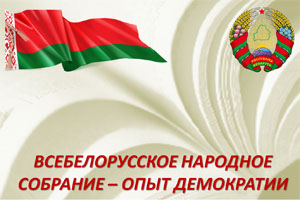Andrei Kabiakou is excited about his being elected a member of the Belarusian people's Congress

Belarusian officials are elected the members of the fifth Belarusian people's Congress.
"I was fortunate to be a delegate to the previous four, now I was elected a delegate to the fifth Assembly. There is a certain element of excitement, despite the fact that this is the fifth meeting for me, because now I'm in a new status, a position, and I will keep before the people the answer for what was done by the Government during the relevant time period, and for the plans that lie ahead to implement in the country", - press service of the Council of Ministers quotes Kabiakou saying.
Andrei Kabiakou stressed the importance of holding such events as the all-Belarusian people's Congress, in which can participate all the most active citizens of the country. "The event was presented by all sectors with an interest group. It is very important to be a member and to hear firsthand the consolidated position, maybe, to argue, to discuss and develop a final course of development in the next five years", - the PM said.
Together with Andrei Kabiakou, the participants of the fifth Belarusian people's Congress from the Maskouski district of Minsk elected 61 persons. Among the elected Minister of Finance Vladimir Amarin, Minister of internal Affairs Igor Shunevich, rector of Belarusian state University Siarhei Ablameika, Chairman of the standing Committee of the Council of the Republic for education, science, culture and social development Nikolai Kazarovets and others.
The Prime Minister also told reporters that the focus in the draft Programme of socio-economic development of Belarus for 2016-2020, which will be discussed at the fifth all-Belarusian people's Assembly, will be placed on the qualitative parameters of economic growth.
"The main emphasis in the provisions of the program made not only to quantitative, although it is also very important, how the quality parameters of growth. We want to offer in this five-year plan to more actively involve market-based instruments to stimulate economic growth. We're not talking about the fact that they now do not apply. But just want more attention to be paid to the quality, financial health, on the economic situation of business entities", - noted Andrei Kabiakou. The Prime Minister stressed that the economy in Belarus is a socially oriented, so its development will be subordinated to the social development of society.
Andrei Kabiakou also said that the Government will offer the core elements of improving public administration. "First and foremost plan to implement the thesis of the electoral program of Alexander Lukashenka about what we need in this five-year period to approach very closely to the separation of the functions of the state as regulator and owner. This is very important in order to organizations of all ownership forms received equal competitive access to resources that are allocated in the economy, " he said. - It will enable more active development of the economy is due to the fact that will involve all the power and ability of society to address socio-economic challenges," he added.
-
03.01
-
07.10
-
22.09
-
17.08
-
12.08
-
30.09










































